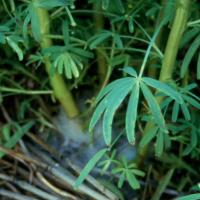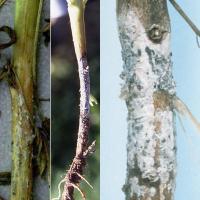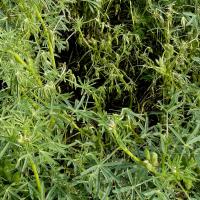Diagnosing sclerotinia collar rot in narrow-leafed lupins
Sclerotinia collar rot is caused by the fungus Sclerotinia minor and should not be confused with Sclerotinia sclerotiorum , which causes a stem rot higher up the plant.
What to look for
- Isolated plants or small groups that wilt and prematurely die in spring.
- Lush, wet crops are most affected.
Paddock
- White fungal growth is evident on the stem just above ground level of infected plants.
- The fungal growth contains small black fruiting bodies, about the size of a pinhead called sclerotia.
Plant
What else could it be
| Condition | Similarities | Differences |
|---|---|---|
| Diagnosing spring drought in narrow-leafed lupins | Premature death. | No white cottony growth. |
| Diagnosing salinity in narrow-leafed lupins | Premature death. | No white cottony growth. |
| Diagnosing charcoal rot in narrow-leafed lupins | Premature death. | No white cottony growth.; ash grey root interior |
| Diagnosing grey mould in narrow-leafed lupins | Stem lesions, premature death. | Grey fuzzy growth.on stem instead of white cottony growth. |
Where did it come from?

Contaminated soil

Contaminated stubble
- The fungus survives between seasons as sclerotia in trash and soil. The sclerotia germinate under suitable environmental conditions and infect plants as fungus grows out from the sclerotia.
- Sclerotinia minor can infect many broad leaf crops, pastures and weeds and is most common in rotations containing broad leaf species in close succession (for example, lupin following canola).
Management strategies
- Sclerotinia collar rot rarely causes large yield reductions.
- Cereals do not host the fungus and will help reduce inoculum levels.
See also
Where to go for expert help
Page last updated: Friday, 17 April 2015 - 2:30pm





